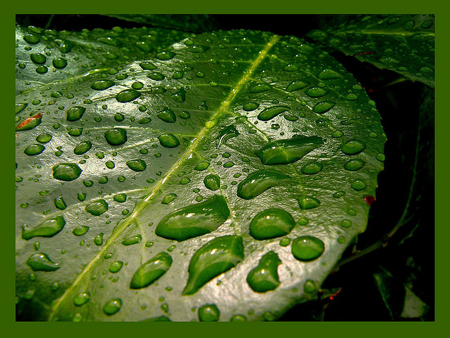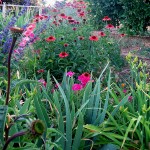Ecotherapy is more than a walk in the woods or watching a beautiful sunset. It’s an emerging form of treatment that can help with healing depression. It aims at restoring the connection to the natural world that is usually limited to high-speed glimpses of windshield scenery.
Reconnecting to the literal earthly world is an important part of wellness, but reading a book on Ecotherapy: Healing with Nature in Mind seemed a little strange. I guess we’ve so lost the natural connection that it’s now a treatment rather than a part of everyday life. I’m reminded that even sunshine has become a form of treatment. Make sure to get your daily dose of 20 minutes to keep your inner lights on.
Lack of connection to people, places, emotions – pretty much anything – is a hallmark of severe depression, and multiple therapies are usually necessary to help get a depressed person out of a world of gray sameness.
Awakening the feelings and senses by participating in the natural world can be a powerful way to begin this process. That doesn’t have to mean heading off to forests and mountains. A few city trees and a strip of urban canyon sky can do the trick. That’s about what I could see out my fifth-floor walk-up in New York years ago.The main thing is to stop and let a living thing get into your senses and mind.
Like everything else these days, there are MRI scans and neurobiology experiments about areas of the brain involved in the perception of natural things. Scientists who study ecopsychology believe there’s a benefit to mindful responsiveness to nature in the form of enhanced growth of nerve cells and neuron circuits – the neuroplasticity concept.
In my purely subjective understanding, I’ve always felt a strong response to the places I’ve lived in. I have a need to reach into those spaces to feel their influence and to let them work on me. It’s partly a need to feel that I belong where I am but even more a desire to get close to the natural as well as the built setting.
I look especially for any bit of terrain that preserves the character of the place as it was before human construction changed it. It’s all too easy to lose touch, not only when depressed but also when overly absorbed by work.
The book, Ecotherapy, is especially interesting because it brings together essays on psychological, spiritual, social and political dimensions of restoring the human relationship to nature. (In this post, I’m talking about the personal dimension related to healing, and will look at other contexts in future posts.)
The “nature” discussed here and in many recent books and articles is not a single thing, but includes the flows of life, even in lands changed drastically by human cultivation. Entering wildland, rural areas of farm and range, or gardens covers many forms of healing experience.
Before there can be healing, though, there has to be an openness to the sensations of each place, a relaxing of mind, a different awareness of one’s own physical presence.
As Jim Nollman puts it in Why We Garden: Cultivating a Sense of Place, this is not something we are born with.
… A sense of place evolves as we live, experience, grow, touch and perhaps taste soil, learn to predict weather, garden. … It begins to evolve only after a person starts to perceive himself or herself participating … with the natural processes of place.
…[A] sense emanates from every part of the body. In other words, a sense of place includes attitudes. And perceptions. And a touch of spirituality: a sensitivity to dreams, perceptions and visions. And gut feelings – like the gut feeling that is currently prompting so many of us to put down roots … .
He also describes sensitivity as including the relationship to place. As he says above, it’s not just about the thoughts and responses but also about participating, getting close to the natural processes of growth and change wherever they may be found.
It’s hard to imagine a more dramatic contrast of experience than that between remote wildlands of vast extent and the backyard garden. Yet both in their own ways can awaken mind, feeling, body and soul to the sense, relationship and sustaining power of the natural world.
The experience of wilderness is that of participating in and responding to a power of nature far greater than anything in our normal scale of living. It is a reminder of a vaster order in life in which we have a place but which we do not control completely. For me, at least, part of the experience is the hard work of getting there, hiking with a backpack for miles. That’s a sort of boot camp to purge and sweat out the stress and preoccupations of a mind-centered self, full of tension, worry and depression.
That purging relaxes me and brings back the ability to be surprised. It opens the senses to awareness and awe in the presence of forces so much greater than the plans of human minds. It changes perspective about what’s important and slows down time and inner rhythm. Healing, for me, is almost incidental to such deep changes of perception, feeling and thought.
Experience of nature at the small scale of the garden is all about participating in a different way, through the daily, hands-in-the dirt work of digging, planting, weeding, watering, composting and a dozen other jobs. It’s about watching closely the daily changes of weather, the influence of heat and cold, rain and drought, the content of the soil and what it can grow.
The sense of time turns to seasons and cycles of growth, the opening of blossoms, the growth of fruit and decay. All around are the presences of living, growing things that instill a close responsiveness to their needs. Gardening adds to who we are as we concentrate thought, touch and all our senses on working with the natural processes unfolding before us.
Of course, it’s possible to heal in the presence of nature without quite so much labor. Walking into a garden or seeing mountains and canyons at a distance evoke two kinds of responses in me. One is the feeling of beauty and balance I get in the presence of great art, a restorative harmony that fills my being. Allied with that is a kind of blending into what I see in a way I think of as spiritual.
I can’t get it very well into words because the experience starts in a part of me that precedes words and thinking. It is the stuff that words and ideas try to capture but never succeed at expressing. Words like transcendence, transformation, vision come to mind. Whatever the experience should be called, it’s often overwhelming, and it’s always healing.
These experiences are shared by everyone to some degree. What are some of the restorative places and moments that stand out in your memory?
(This is a rewritten version of a post I did a few years ago. I live in such a healing place now that it seemed a good time to revisit these ideas.)
Image by frapestaartje at Flickr




I have struggled with having a sense of purpose. Maybe because in my family, purpose always meant having a great job that made a lot of money, especially if you can still be your own boss. If you weren’t productive or creative every other day, it was like a sin. But it was all linked to “fitting in” socially, feeling rooted in a church, a neighborhood, a group that did things together. Or having a creative “product” to prove your worth. I never felt I fit in. So those social and occupational purposes didn’t do anything for me.
John, your mention of Jim Nollman’s book about gardening touches on a sense of purpose I did not get with people or productivity. I worked as a florist’s apprentice for about 3 yrs many years ago. I started raising houseplants at home. I planted seeds from the lemons I ate and watched them grow. I tended to sick plants and buried dead plants! I thrilled at the heavy-duty pink of flowers on my Crown of Thorns plants. I felt a real connection with life itself when I sifted dirt through my fingers deciding whether the plants needed water. My plants used the breath I breathed out to make new oxygen that I breathed in. This is still when I feel a purpose. That purpose is the realization that I am a contributor to the process of all life on earth. Living, dying, breathing, being. And then I know I am enough.
I ‘ve started taking photographs, while sitting in my garden in the day & night …..
Hi John I was touched by your description of what happened for you crossing the cold and shallow creek while hiking. Unfortunately I can’t find where it is again on this site to re read it but it had great resonance and straight away reminded me of images from the bible, I would love to read any further reflections you have had about this small but highly significant encounter with yourself and what?…the great healing spirit of nature? I had something a bit similar happen through having a dip in a stream not far from where I live ( in the sub tropics in Australia so not as sharply chilly and awakening as your mountain stream! ). Just one of those ‘moments’ that are so laden …almost beyond words and you know something has made such deep contact. For me it was coming to my senses in nature ,from a long way away in depression .I immediately felt 80% better throughout my whole body… aches and pains and lethargy all gone(!) and this lasted for days making the rest of my camping trip lovely. I am fascinated by these sort of experiences that are not mediated by a therapist or technique, precipitated or preceded by great occasion or particular sharpness of misery …so what do we call them…grace? I think these moments require a particular ‘openness’ and perhaps preparedness (?) to happen. Love reading about healing moments .I think we should all take off our shoes wherever we are each day, for 5 minutes !!! Cheers
A beautiful piece, John. I wrote about gardening’s mental health benefits last summer (research is relatively scarce, but I mention a few interesting studies), and will add a link to yours. Thanks!
Hi, Amy –
Thanks for the link and mention. I’ve subscribed to your blog and look forward to reading more of your great posts.
John
Soothing sound of the trees while the wind is blowing in the midst of the afternoon is really calming. Made me realize how nature comforts us.
Hi, vhien –
Nature does a pretty good job of healing, if we let it.
Thanks for dropping by.
John
I think that water is a common theme for me. Desert is a quite different experience – vast and spiritual in a sense. But for me, so far anyway, the soothing and healing is connected with water.
Hi, Evan –
Ah, water! I couldn’t agree more. I wrote a post once about an incredible healing experience when crossing a little creek in my bare feet. When I worked on water policy issues (stressful), I visited dozens of rivers, springs and lakes. That was a healing balance to the difficulties of dealing with lawyers, property rights fanatics and manipulative advocates of all types.
John
I just came in from painting the inside of a portico at the front of my house. The ceiling and walls were painted dark brown, and it blocks a lot of light from my kitchen. In the last few days I have spent hours out there developing my vision. A light blue ceiling to represent sky through the long winter. I plan some putty-colored walls to pick up the color of the mortar between the terra-cotta bricks.
I’ve been surrounded by the green of my yard and my neighbors’. The sun has been out the whole time. I had some hours of hot and sweaty work, some cool breezes passing through. I could literally watch paint dry. Neighbors were in and out of their houses – I didn’t have any conversations, but it meant that I was in the same world as other people.
Now that you mention the healing of nature, I’m reflecting back on what was seeping in around the edges even as I worried and obsessed and worked on not worrying or obsessing. A little retrospective mindfulness, if you will.
As always, thanks for a useful bit of insight in my bipolar daily life.
Hi, Karen –
I think the best kind of healing happens when you are not consciously seeking it out. You do something outside, work with your hands and heart, or find yourself in a special place. The most restorative effects can be incidental to carrying out a different purpose altogether. (Actually I’m doing a post on that right now…)
I’m glad the post was helpful.
John